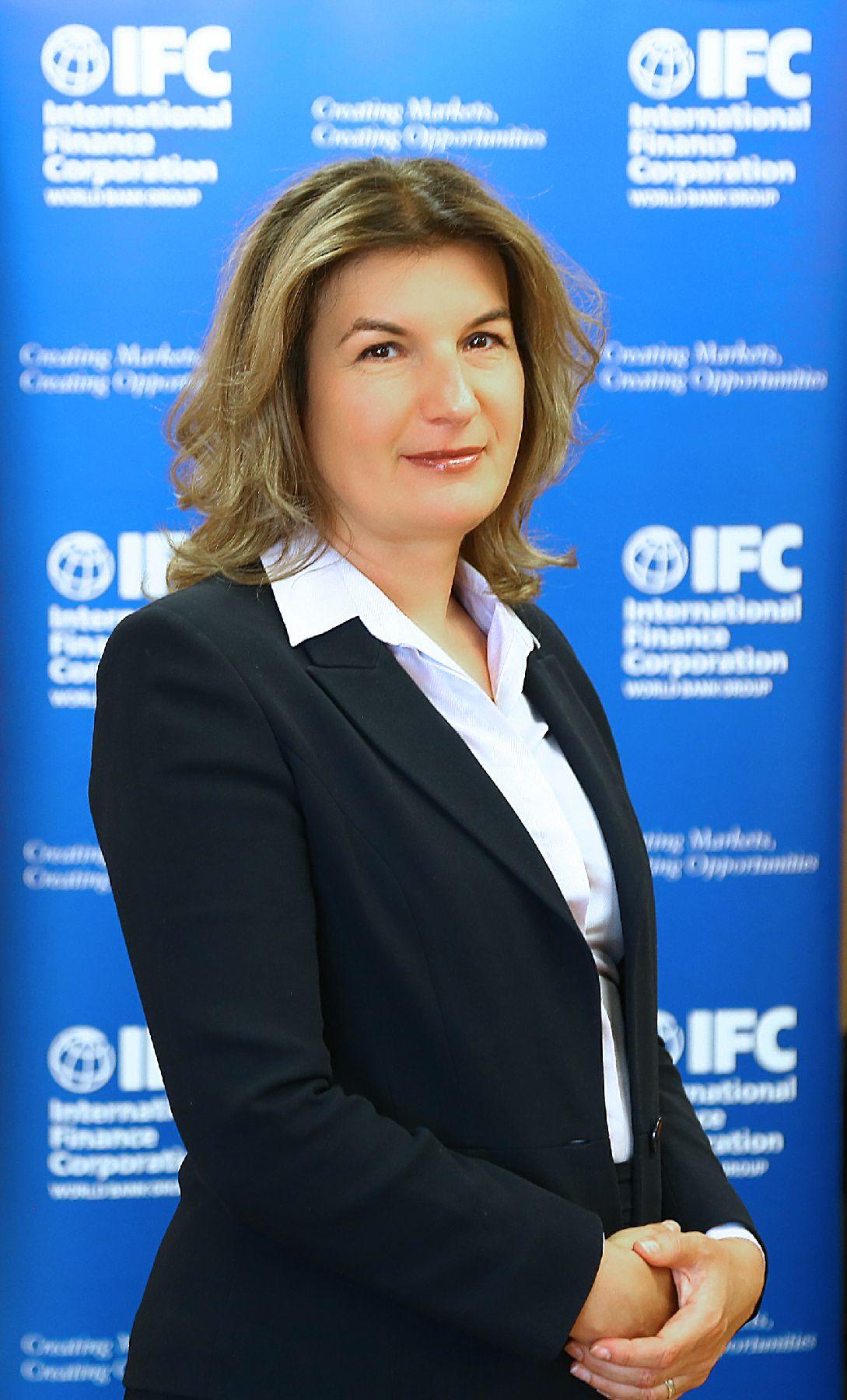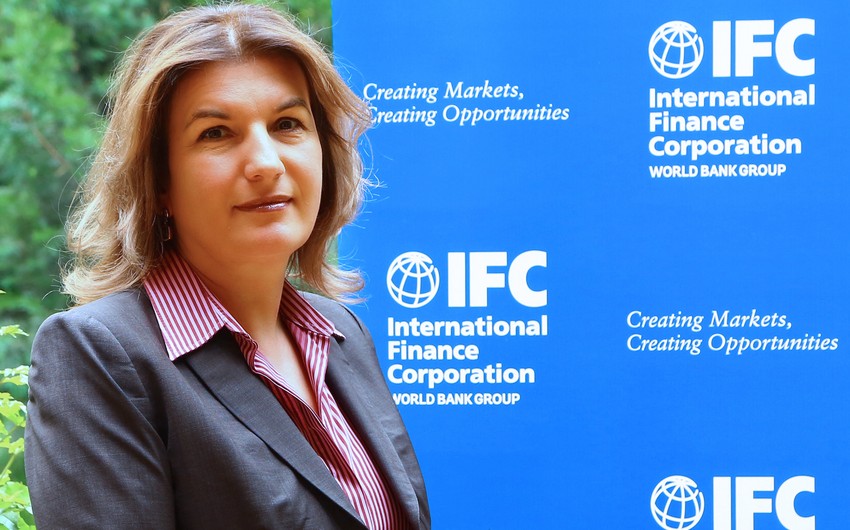As Azerbaijan strives to modernize its economy, promote sustainable development, and strengthen the role of the private sector, cooperation with international financial institutions remains an important element. International Finance Corporation (IFC), a member of the World Bank Group, plays a key role in supporting reforms, attracting private investment, and developing strategic sectors.
Ivana Fernandes Duarte, IFC regional manager for the South Caucasus, spoke to Report in an exclusive interview about IFC's current priorities and plans in Azerbaijan - from supporting green growth, water security, and sustainable infrastructure to promoting digitalization and expanding access to finance for small and medium-sized businesses.
Report presents the interview:
- Which sectors of Azerbaijan’s economy do you consider the most promising for private investment from IFC’s perspective? What areas could become key growth points for cooperation between IFC and Azerbaijan over the next 3–5 years? What new projects involving IFC are planned in the country for 2025?
- IFC is prioritizing agriculture, water security, and sustainable construction as key sectors for private investment and collaboration in Azerbaijan.
In agriculture, we are working with the government to introduce innovative financing tools like crop receipts and warehouse receipts, enabling small farmers to access working capital by using future harvests or stored crops as collateral. This approach aims to integrate farmers into global value chains, support growth, and stimulate rural employment.
In the water sector, we aim to help address the country's growing water scarcity challenges. With 50 to 70 percent of Azerbaijan's runoff originating from neighboring countries that are also facing rising demand and diminishing resources, water scarcity is a critical issue. IFC can support Azerbaijan in developing strategies to enhance the sector's sustainability, address water scarcity and improve wastewater treatment. We are also exploring financing opportunities in desalination.

In the construction sector, IFC is actively supporting the government's green building initiatives, which offer both financial and environmental benefits to companies. For example, the AlatBay Logistics Center, located within the Alat Free Economic Zone, successfully completed the design, construction, and audit stages of EDGE - an innovative green building certification system developed by IFC - and has been awarded the EDGE Advanced certificate. Through these efforts, the center has reduced its energy use by over 40 percent and water consumption by over 25 percent.
Additionally, we are exploring investment opportunities in transport, logistics, and e-mobility to support Azerbaijan’s efforts to enhance sustainability and connectivity.
- What is the volume of IFC’s investments in Azerbaijan to date, and which sectors have received this funding?
- Since joining IFC in 1995, Azerbaijan has seen IFC investments totaling approximately $900 million across nearly 60 projects, spanning key sectors such as financial services, infrastructure, and manufacturing. Beyond financing, our advisory services have contributed to improving the business environment, strengthening the financial sector, enhancing corporate governance, and fostering the development of SMEs and agribusiness.
- What steps, in IFC’s view, could contribute to the growth of the private sector in Azerbaijan? How do you assess Azerbaijan’s progress in improving the investment climate and business environment?
- A conducive business environment, coupled with financial and banking sector reforms, is essential to bolster Azerbaijan's economy and drive the growth of its private sector. For years, IFC has been advising the government on fostering a favorable regulatory framework for business, with a focus on business inspections, licensing and permits. The progress so far has been remarkable, and we remain committed to supporting these ongoing efforts to attract greater private investment in key sectors such as transport, logistics, and other productive industries.
Public-private partnerships (PPPs) are also essential for increasing private sector participation in infrastructure and other critical sectors. We plan to deepen our collaboration with Azerbaijan's government to unlock private capital and expertise, particularly in infrastructure development, which is essential for sustainable economic growth.
- How actively are you working with local banks and financial institutions to expand access to finance for small and medium enterprises?
- We actively work to improve access to finance for smaller enterprises by partnering with local banking institutions like Bank Respublika, which provide funding to micro, small and medium enterprises (MSMEs). We plan to continue this strategy with both current and potential partners.
Additionally, we offer advisory services to financial institutions to enhance sustainable finance and governance practices. To improve SME financing, we advocate for asset-based financing, enabling smaller businesses to use their movable assets, such as inventory and equipment, as collateral. This approach helps ease access to finance for a broader range of businesses. In line with this, we are working with the Azerbaijan Banks Association to support the development of a national asset-based finance tool.
- What projects in green energy and sustainable infrastructure is IFC supporting in Azerbaijan? Are there specific initiatives to support decarbonization and the green transition, particularly in the energy and transport sectors?
- IFC is committed to supporting Azerbaijan's efforts to develop its renewable energy sector, which holds significant potential, including an estimated technical capacity of 23 gigawatts of solar energy and 157 gigawatts of offshore wind capacity.

Investing in extensive regional digital and transmission infrastructure, like the Black Sea Submarine Cable or the Green Energy Corridor, could allow the country to capitalize on its abundant energy resources and establish itself as a major global green energy exporter. The transport sector currently accounts for 22.6 percent of total energy consumption, which could be reduced through investments that expand charging infrastructure for privately financed electric vehicles and enhance urban transport options, such as renewing the country's bus fleet—a process that is already underway. We also welcome the government's tax incentives for electric vehicles.
Additional measures, such as improving fuel efficiency standards, offering incentives to replace old vehicles, and optimizing freight transport operations, are also important. The government is currently developing the necessary regulatory, policy, and institutional frameworks, and IFC could potentially provide advisory and investment support along the value chain where private sector solutions can be implemented.
Azerbaijan also plays a key role in the Middle Corridor, which runs through the South Caucasus. With traffic on the Middle Corridor increasing annually and the government’s extensive plans to modernize key railway sections to meet increasing demand, IFC could explore investments in renewing the rolling stock of railcar transport operators, to further enhance the corridor’s efficiency and sustainability.
- Azerbaijan is actively developing its infrastructure as a transit country. Is IFC interested in participating in transport corridor projects (e.g., the Middle Corridor)?
- Given its strategic location, Azerbaijan has significant potential to establish itself as a regional transit and transport hub. IFC is well-placed to work with the country in this area and help unlock new opportunities by leveraging private investment.

- What are IFC’s priorities in the South Caucasus, and what role does Azerbaijan play in this strategy? How important is regional cooperation among South Caucasus countries for IFC in the context of logistics and energy projects?
- As we know, a chain’s true power comes from the unity of its links - highlighting the vital role of regional collaboration in driving successful logistics and energy projects across the South Caucasus.
The Port of Baku in Azerbaijan and Port of Poti in Georgia are both key logistics hubs in the South Caucasus. We welcome the recently announced expansion plans for the Port of Baku, which aim to boost its cargo handling capacity and strengthen its role along the Middle Corridor. Among other measures, this expansion aims to increase the port's annual cargo turnover from 15 million to 25 million tons and construct new container terminals.
As cargo is then transported via the South Caucasus - by rail, road and other means - it is important to ensure these corridors have sufficient throughput capacity and are supported by an adequate number of logistics terminals along the way.
In energy, the development of large-scale renewable energy projects depends on a reliable grid and transmission system. These are also crucial to support Azerbaijan’s ambitions to export green energy to Central Asia and Europe. Strengthening regional energy infrastructure will be key to realizing these goals and fostering greater cooperation across the South Caucasus.


 https://images.report.az/photo/7d8b09e5-905c-3389-92e3-dda749269b41.jpg
https://images.report.az/photo/7d8b09e5-905c-3389-92e3-dda749269b41.jpg

